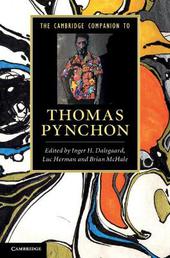
|
The Cambridge Companion to Thomas Pynchon
Hardback
Main Details
Description
The most celebrated American novelist of the past half-century, an indispensable figure of postmodernism worldwide, Thomas Pynchon notoriously challenges his readers. This Companion provides tools for meeting that challenge. Comprehensive, accessible, lively, up-to-date and reliable, it approaches Pynchon's fiction from various angles, calling on the expertise of an international roster of scholars at the cutting edge of Pynchon studies. Part I covers Pynchon's fiction novel-by-novel from the 1960s to the present, including such indisputable classics as The Crying of Lot 49 and Gravity's Rainbow. Part II zooms out to give a bird's-eye-view of Pynchon's novelistic practice across his entire career. Part III surveys major topics of Pynchon's fiction: history, politics, alterity ('otherness') and science and technology. Designed for students, scholars and fans alike, the Companion begins with a biography of the elusive author and ends with a coda on how to read Pynchon and a bibliography for further reading.
Author Biography
Dr Inger H. Dalsgaard is Associate Professor of American Studies, Department of English, University of Aarhus, Denmark. Luc Herman is Professor of American Literature and Narrative Theory at the University of Antwerp. Brian McHale is Distinguished Arts and Humanities Professor of English at Ohio State University.
Reviews"Anyone interested in classic postmodern theory and and how it still defines the way innovative US fiction is read should read this book. --Ali Chetwynd, University of Michigan
|